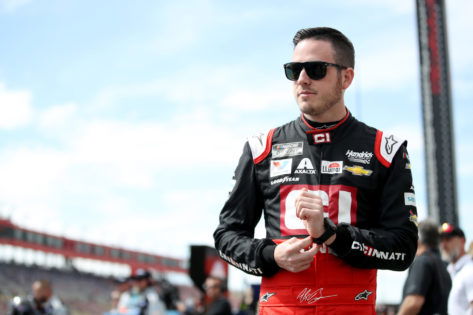At Richmond Raceway, what typically passes as late-race noise over team radios turned into one of the most dissected soundbites of the Cup Series weekend. As the laps wound down in a tense playoff push, Alex Bowman’s frustration spilled over: his voice cut across the radio waves, sharp and biting. In his view, lap traffic running in his line derailed any chance at moving forward, costing him position in a pivotal stretch.
It wasn’t the first time motorists at Richmond had tangled over racing etiquette in heavy traffic. Short tracks magnify the stakes, where lap cars fight tooth-and-nail to stay in the hunt while playoff contenders insist those same cars should clear out. Bowman, caught behind the 33 and 88 cars, saw his run dissolve in a clogged middle groove. The moment triggered heated analysis from fellow drivers, spotters, and insiders who viewed the situation through very different lenses.
The outburst, the block, and the backlash
When Alex Bowman keyed up his radio and vented, “This is race manipulation, and he needs to give us a f**ing exit,” the frustration went well beyond a single restart at Richmond. Bowman entered the night as one of several Chevrolet drivers teetering near the playoff cutline, where every point carried amplified importance. In that environment, being pinned behind lap cars felt like more than just an inconvenience. To Bowman, every second lost cut deeper into his fading playoff margin.
On Door Bumper Clear, Freddie Kraft wasted no time unpacking what triggered the rant. “I think the race manipulation he was bit****g about was Jesse Love, right? He felt like Jesse was blocking him… which is a teammate of the 3,” Kraft explained.
The detail mattered: Austin Dillon, driver of the No. 3 and a playoff hopeful himself, benefitted indirectly if Bowman’s path was slowed. “I don’t know that he was gonna get there anyway, but you might expect Chevy teammates to cut you a break. They don’t have to.” That last point became a flashpoint of discussion.
Manufacturer alliances are supposed to run deeper during the regular season and playoffs, but as Kraft reminded listeners, relationships between drivers often outweigh brand loyalty in the heat of competition.
Earlier in the year, Bowman and Noah Gragson tangled at Nashville, an incident many in the garage haven’t forgotten. “They’ve had run-ins this year… Noah’s not gonna cut him a break,” Kraft noted. “That’s what we mean when we say things come back to bite you.”
For reporter Bob Pockrass, the radio outburst raised another layer of intrigue: playoff strategy itself. “At first I thought maybe SVG’s thinking, well, I’d much rather race Austin Dillon in the playoffs than Alex Bowman… is that a strategy? Can you block somebody to keep them out of the playoffs? Is that okay?” Pockrass asked. His framing highlighted the chess-like margins facing teams down the stretch, where a choice by a lapped car could arguably shape the postseason grid.
Yet Pockrass also cautioned against assuming foul play. Shane van Gisbergen (SVG), fighting for the “free pass” spot under caution at the time, had his own survival battle underway. “If he feels like he needs that line to keep that lucky dog spot, that’s his right too,” Pockrass stressed. What looked like “manipulation” from Bowman’s cockpit could also be valid self-preservation from a driver clinging to track position.
By night’s end, Alex Bowman himself scaled back his rhetoric, admitting in post-race remarks, But even with the walk-back, the fire was lit: his frustrations exposed the tangled web of teammate obligations, personal rivalries, and playoff maneuvering that has become increasingly visible under the microscope of short-track racing.
Playoff pressure, consistency, and Alex Bowman’s hard truths
Richmond’s drama underscored the relentless pressure facing Alex Bowman as the last Hendrick Motorsports entry fighting to secure a playoff spot. Unlike teammates William Byron and Kyle Larson, who’ve traded wins and points-lead punches, Bowman’s 2025 arc has been defined by consistency, thirteen top 10s, five top 5s, yet zero trips to Victory Lane.
His average finish ranked just behind the HMS frontrunners, with three DNFs compounding his challenge; and through two starts at Richmond this season, he finished exactly 17th both times, mirroring his spring qualifying position.
Still, the team-wide resilience Jeff Gordon praised kept Bowman in the hunt, and with two races left, his playoff future hangs by the thinnest of threads, a 60-point cushion that could be erased by a single bad restart or a new winner leapfrogging the cut.
Bowman, pressed on his mindset, offered an honest two-word admission about playoff stress: “certainly stressful.” Facing the possibility of being locked in with a solid Richmond result, he reflected, “So, realistically, we’ll just have to wait and see how this week shakes out, and kind of go from there.”
For Alex Bowman, the playoff push isn’t about radical gambits, but maximizing each opportunity, collecting stage points, executing clean runs, and refusing to back down from the challenge Richmond’s tricky surface and shifting grip levels present. While his “race manipulation” accusation stoked a debate, his true focus remains: keep digging, keep performing, and let the results tell the story.
The post NASCAR Insiders Split on Alex Bowman’s ‘Race Manipulation’ Outburst as Richmond Traffic Block Sparks Debate appeared first on EssentiallySports.
